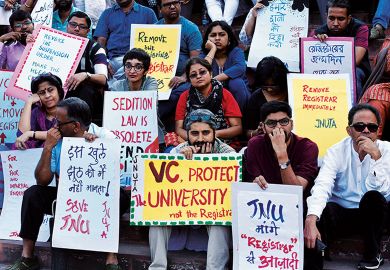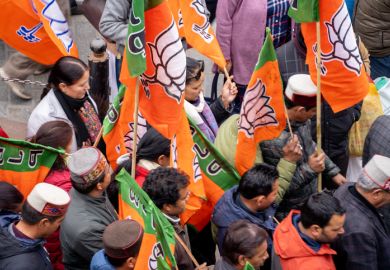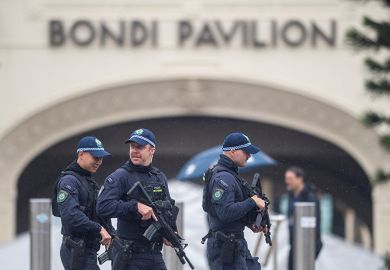Good things are being said about India’s new cadre of elite private universities. Institutions such as Ahmedabad, Ashoka, Azim Premji, Krea, O. P. Jindal Global and Shiv Nadar universities have hired well-qualified faculty and are attracting growing numbers of high-achieving students from across the country.
However, other than the usual challenges that India’s private universities face – notably, the complex regulatory environment – the elites have to contend with another big and growing problem: how to deal with state or national governments when faculty produce research that politicians object to.
So far, the universities’ solution has been to part company with the academics concerned. This is illustrated by the recent resignation from Ashoka of a faculty member whose controversial research paper claimed that the ruling Bharatiya Janata Party (BJP) used electoral manipulation to win many closely contested constituencies in 2019.
Older private universities did not face this problem. They limited themselves to offering degrees in engineering or business management; humanities and social science departments, if they existed, were minuscule. Few, if any, carried out any research. But the elite privates are comprehensive institutions that include large social sciences departments. They are research-oriented, and their faculty roster is comparable to that of major public institutions. Inevitably, such high-calibre faculty sometimes produce research that irks politicians.
While the Indian government has never been comfortable with criticism from academics and has been known to pressure them in various ways, the frequency and intensity of hostility has increased significantly since the BJP came to power under Narendra Modi in 2014.
There are numerous cases of government harassment at relatively obscure universities that seldom make news headlines, so it is impossible to know exactly how deep the problem goes. But what we do know from news coverage is that the government has routinely targeted prominent public institutions to intimidate their faculty into refraining from “anti-India” or “anti-national” activities, including research.
The elite private universities have not been spared, either. Two incidents are illustrative of the larger problem they face.
In October 2018, Ahmedabad University announced that the historian and biographer Ramchandra Guha would join the institution as a titular professor. Ahmedabad is located in Gujarat, Modi’s home state, where he was chief minister for more than a decade and where politics have been dominated by the BJP since the mid-1990s.
Soon afterwards, members of the Akhil Bharatiya Vidyarthi Parishad (ABVP), a right-wing student organisation affiliated to the Hindu nationalist organisation Rashtriya Swayamsevak Sangh (RSS), protested against Guha’s appointment, describing his work as “critical of India’s Hindu culture” and as “anti-national”. It was reported that ABVP members posed a real threat to Guha’s personal safety. The details of what happened subsequently cannot be confirmed, but soon afterwards Guha declined to accept the position and later blamed the BJP for having made it impossible for him to take up the post.
There was also an earlier incident at Ashoka. In 2017, the university appointed Pratap Bhanu Mehta, a known critic of the BJP, as its vice-chancellor. Mehta continued to write columns in the Indian Express newspaper chastising the BJP and Modi for their policies. Two years into his tenure, Mehta resigned his office, citing a desire to focus on his research. Then, in 2021, he resigned from his professorship as well, after being told by his employers that he had become a political liability.
This pattern is unlikely to change for several reasons. First, India’s elite private universities are all backed by prominent businessmen, who tend to be pro-government. Many are known to be supportive of the BJP government in ideological terms.
Second, the Modi government has shown itself to be relentless in using all means at its disposal – legal and extralegal – in going after individuals and institutions it sees as undermining its agenda. For those business people who are funding private universities, there is always a threat that the government could go after their businesses.
Third, standing up to this government could compromise the future of the universities themselves, in all sorts of ways. And however pure and lofty its aspirations, an institution’s first instinct will always be self-preservation.
Those hoping that India’s private universities will stand up for academic freedom under the current government are likely to be disappointed.
The author prefers to remain anonymous.
Register to continue
Why register?
- Registration is free and only takes a moment
- Once registered, you can read 3 articles a month
- Sign up for our newsletter
Subscribe
Or subscribe for unlimited access to:
- Unlimited access to news, views, insights & reviews
- Digital editions
- Digital access to THE’s university and college rankings analysis
Already registered or a current subscriber?








